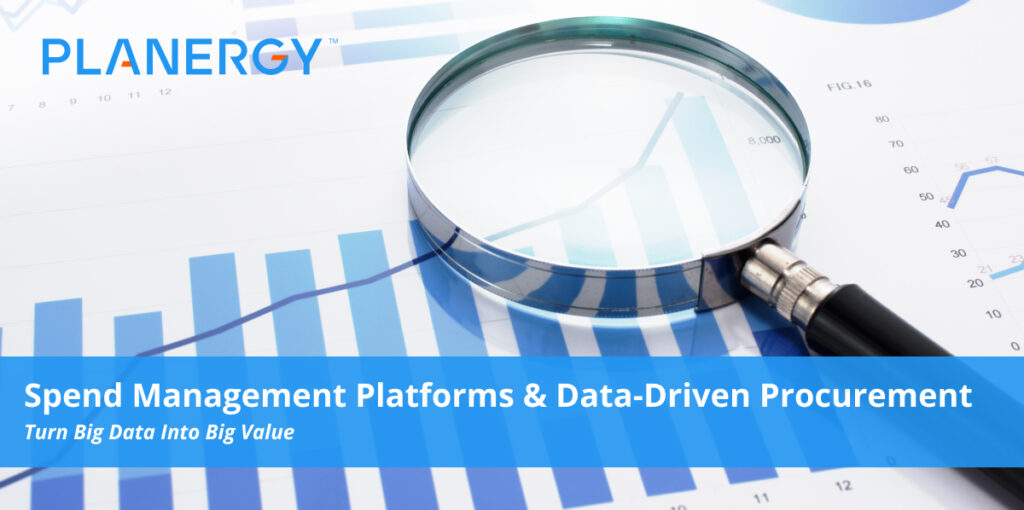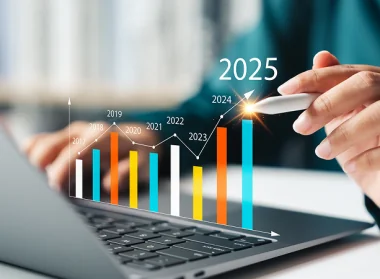As the marketplace evolves, cohesive information management is quickly becoming an essential weapon in the war for market share and a healthy bottom line. For procurement organizations, this management takes the form of data-driven procurement, i.e. strategic purchasing, cost reduction, and supply chain management informed by in-depth data collection and analysis.
Properly implemented, data-driven procurement, supported by next-gen spend management platforms, can augment and simplify your procurement team’s ability to collect and analyze data—and turn it into better decisions. Understanding how these emerging technologies work is the first step to making them a key part of your current and future success.
Data-Driven Procurement: The Future of Strategic Spend
In order to maximize your return on investment (ROI), achieve optimal efficiency, and create long-term value for your organization as a whole, your procurement team needs comprehensive data—and a smart way to manage it. Big data is no longer an abstract theory for futurists. It’s at the core of the digital transformation redefining effective procurement performance and risk management.
Paired with data-driven platforms designed to integrate with your enterprise resource planning (ERP) and other software packages, this approach to procurement gives you unparalleled visibility to previously fragmented and siloed information. Using artificial intelligence (A.I.), e-procurement software can collect and analyze data at all points of the supply chain—internal and external—and across your entire organization. This business intelligence can then be leveraged into smarter decision-making and help you refine not just your spend, but all of your business processes.
Big data is no longer an abstract theory for futurists. It’s at the core of the digital transformation redefining effective procurement performance and risk management.
The Benefits of Data-Driven Procurement
Digital disruption isn’t coming—it’s here. Outmoded management tools lack the breadth and depth of next-gen spend management platforms, which is why both procurement managers and senior executives at businesses around the world are moving beyond cost reduction and transforming procurement into a strategic tool for building real, lasting value.
Collecting More of the Right Data
Harvesting as much Big Data as possible from the vast sea of information that inundates the modern business world probably sounds like a pretty good idea. But to get actionable insights and create a competitive advantage, you need quality and quantity. Procurement professionals at best-in-class organizations rely on analytics tools built into their e-procurement software not just to collect information, but to:
- Identify challenges to be addressed (e.g., indirect spend management, efficiency gains, etc.)
- Collect and distribute information to the software’s artificial intelligence to create accurate knowledge models for analysis and strategic planning
- How much information is already in the organization’s datasphere, how much more is needed, and where it can be found.
Collecting information from relevant in-house talent, data scientists, and external sources like government institutions, legal directories, industry organizations and data vendors is also greatly simplified. This gives you a rich potential pool from which to collect the information that’s most useful to your business and giving your software suite the fodder it needs to generate useful models focused on cutting costs, boosting efficiency, and streamlining your supply chain.
Developing Effective Procurement Knowledge Models
Machine learning empowers the artificial intelligence in procurement software packages to build useful connections between disparate sets of data. These connections are known as knowledge models, and can be as complex as circumstances demand. They enable the A.I. to simulate human thought, and provide useful insights derived from the data provided.
You could (for example) create a supplier category for titanium widgets, complete with sourcing, quantity, and pricing information. Developing a knowledge model that enables the software’s A.I. to understand the context of these factors makes it easier to ask important questions like, “Which titanium widget manufacturers are in China, and how much do they charge for 10,000 units?”
These knowledge models can be further enhanced to provide not only real-time data retrieval on a constant basis, but effective strategic planning, too. As your web of connected knowledge models grows, your A.I. will be able to calculate the effective probability that a supplier of printers (for example) sells toner, too. Actionable insights like this can help you refine your category management and requests for proposals (RFPs) distributed to potential vendors.
Simplified Procurement Processes
An old-fashioned procurement to pay (p2p) process wastes a lot of time, energy, and resources at every stage. Shifting toward a data-driven approach streamlines these processes. Your team can use automation to reduce the number of necessary steps in a given process (approval, for example) from ten to three if the A.I. can handle the other seven without needing human eyes or hands. Expand this streamlining to p2p as a whole, and what used to take weeks or even months can now happen in days, without fear of compliance issues or exposing your company to unnecessary risks.
With spend analysis tools, it’s much easier to identify total spend, track long-term spend patterns and engage in strategic forecasting. This can help you identify optimization opportunities with your vendors, since you’ll have full spend data at your fingertips and can negotiate much more effectively for terms, price, and service.
When compliance and risk management are built-in thanks to well-developed knowledge models and effective integration, approved users see the information they need to make better decisions, when they need it. Costs drop, efficiency improves, and all those little problems that used to throw a spanner in the works—like invisible or unauthorized spend, poorly-defined RFPs, or questionable contracts—disappear.
Better Supply Chain Management
Building better supplier relationships requires collaboration, smart negotiation, and managed compliance. The insights gleaned from e-procurement software can help you:
- Improve supplier category management
- Identify suppliers with the best overall value
- Negotiate mutually-beneficial agreements
- Achieve maximum ROI based on value rather than cost
- Evaluate vendor performance based on key metrics and streamline total vendors
- Enforce contract compliance via continuous monitoring
Stronger Collaboration
Your procurement organization touches every part of your business, and effective procurement can help each department reach its own goals while supporting the overall goals of your company as a whole. With total visibility and AI-enhanced strategy, your procurement processes can function in tandem with your ERP.
With data available to everyone involved in the project, from content specialists up to senior management, transparency and communication are greatly improved. Procurement can provide strategic spend data to ensure other departments get the best ROI while enforcing compliance and reducing or eliminating redundant or maverick spend.
The datastream created by this integration flows outward to other business units as well. For example, marketing can focus more of its budget on the verticals that bring the greatest return, or the finance department can use spend analysis data to create better forecasts and more accurate reports.
Let Data Drive Your Business to New Heights
When it comes to navigating the high seas of modern spend management, treading water simply won’t do. Dive deeper into your data, and leverage the treasures you bring back to the surface to give you a competitive advantage.
Make data the driving force of your procurement policies and planning, along with a smart spend management platform. It’s easier than you might think to jettison the dead weight of excess risk, high costs, and maverick spend while boosting value, ensuring compliance, and improving collaboration.




